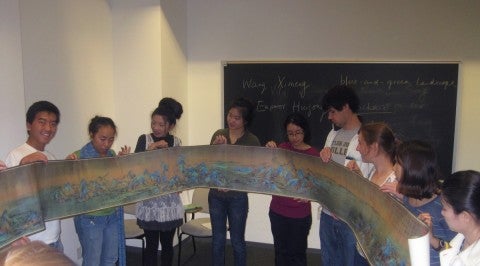This summer 2019, Ph.D. Alumna Olivia Wolf joined the Calouste Gulbenkian Museum’s Visiting Scholars Program in Lisbon, Portugal, researching key works within the museum's prestigious Modern Collection for a scholarly article. She is also continuing to work on her book manuscript based on her dissertation, Migrant Constructions and Mahjar Monuments: Transnational Art and Architecture in Modern Argentina, 1910-1955.
After completing her Ph.D. in the art history department at Rice University under the direction of Fabiola López-Durán and Shirine Hamadeh, Olivia joined the University of Tennessee-Chattanooga as a tenure-track assistant professor of art history. Dr. Wolf’s research and teaching interests include Latin American art and architecture, Islamic art and architecture, and issues of migration and identity in non-western modernisms. Wolf's teaching and research focuses on Modern and Contemporary art and architecture from a global perspective, with emphasis on Latin America, the Middle East, and South-South connections.
Wolf’s research has been supported by prestigious national and international grants from the Fulbright Hayes DDRA Program, the Society of Architectural Historians, the National Endowment for the Humanities, and the Max Weber Foundation. She was also the recipient of the 2017 Lodieska Stockbridge Vaughn Award in the Humanities. While at Rice University, she was extremely productive and dynamic: organizing events including the Graduate Interdisciplinary Symposium “Global Modernism,” collaborating with local institutions such as the Museum of Fine Arts Houston (MFAH) and the International Center for the Arts of the Americas (ICAA), publishing book chapters, exhibitions essays, and refereed articles in Europe, Latin America and the US, while actively speaking in international conferences.
During her years conducting dissertation research in Argentina, Wolf also taught at NYU-Buenos Aires, became a research member at the Universidad Nacional de San Martín’s TAREA-IIPC Cultural Patrimony Research Institute, and established a meaningful relationship with the Syrian-Lebanese and Armenian communities who were at the center of her studies on diasporic patronage there.
PhD Alumna Olivia Wolf at Calouste Gulbenkian Museums Visiting Scholars Program
July 19, 2019


